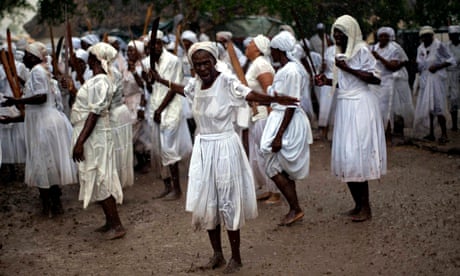Creolization in the Caribbean
Hey everyone, welcome to my blog! I hope you guys are doing great. Today, I just wanted to discuss my growing interest in the topic of creolization in the Caribbean. With there being so much diversity and uniqueness in the cultures celebrated all throughout the Caribbean, what’s not to love? In a nutshell, "creolization" is the mixing of multiple cultures, ranging from music to religion, to form one distinct culture. As mentioned in Tour de Force: A Musical Journey of the Caribbean by Christine Gangelhoff, many languages can also be attributed to creolization, such as creole languages in the Caribbean. More specifically, Kreyòl ayisyen, which is the result of interactions between French and many other languages spoken in Haiti. There are numerous reasons for this cultural blending, but the African diaspora is without a doubt the most important. Because of the forced relocation of Africans from their homelands to the Caribbean, there has been an explosion of diverse cultural expressions throughout the Caribbean, despite colonizers' efforts to discourage such expression. One can only imagine how deep this cultural mixing actually goes! Find below a picture of Haitians of the kreyol tongue celebrating the Carnival festival, taken from https://www.carnivaland.net/haiti-carnival/.
Moving onto our first example of creolization in the Caribbean, we have the widely stigmatized religion of voodoo! Originating in the Benin Republic, which is located in West Africa, voodoo has been a prime example of creolization occurring in the Caribbean. For the most part, voodoo has many negative connotations associated with it, as the large majority of people write it off as black magic with primitive traditions. However, the participants of this religion would beg to differ. Voodoo became a creolized religion as a result of the massive number of Africans transported to Haiti, known as Saint-Dominque, in the 16th century. This is because it has roots in both ethnic African religions such as Yoruba, and Catholic principles that were present in Haiti because of the Europeans. Voodoo is also a monotheistic religion, and similar to the saints present in Catholicism, there are Iwa’s in voodoo, which act as intermediaries between the common man and the all-powerful god in voodoo known as Bondye.

Please see above a photo of Haitians honoring their ancestors by performing voodoo rituals. Taken from http://haiticonnexion-culture.blogspot.com/
During the coveted Haitian Revolution, which occurred between 1791 and 1804, voodoo was credited with playing quite an important role, as two renowned Haitian slaves and revolutionary leaders, Boukman and Makandal were cited as voodoo priests. Due to voodoo not being recorded via text, slave masters were not privy to information regarding the religion and what was being planned for the revolution, promoting unity and organization amongst the enslaved Haitians. Alongside this, voodoo ceremonies were performed at the beginning of the revolution, and many voodoo enthusiasts believe it played a quintessential role in their victory as the first and only Caribbean nation to have thwarted the system of slavery. As a result, Catholic clergy fled the nation due to fear of intolerance; however, they returned in 1860, which prompted a mixture of Catholic symbolism into the voodoo religion without much fuss. Nonetheless, once Catholicism was restored in Haiti, voodoo practitioners began to be shunned for being accused of being overly reliant on superstition and engaging in rituals similar to those associated with Satanism, yikes.
Alongside this, voodoo also traveled to the Americas after the Haitian Revolution due to many Haitians seeking further security and refuge from their homeland. With the large influx of Haitians into Louisiana and the southern Americas, voodoo became very popular in New Orleans. Voodoo and other Afro-Caribbean religions would incorporate elements of prominent American religions such as Christianity, with Christian ministers also displaying certain Voodoo traditions in their sermons or masses. Dr. John, renowned for his fortune telling and skill as a healer, and Marie Laveau, a devout Catholic tutored by Dr. John, were two prominent Voodoo figures in America. She assisted many slaves in becoming businessmen so they could make a better living for themselves.
For a showcase of Haitians performing voodoo rituals, and some exposition on their views towards the religion, please see the video attached.
Dialogue Institute and Journal of Ecumenical Studies. (2020, September 16). Dialogue Institute and Journal of Ecumenical Studies. Retrieved from Dialogue Institute: https://dialogueinstitute.org/afrocaribbean-and-african-religion-information/2020/9/16/vodou
Gangelhoff, C. (2019). Tour de Force: A Musical Journey of the Caribbean. Vital Source Bookshelf.

Comments
Post a Comment